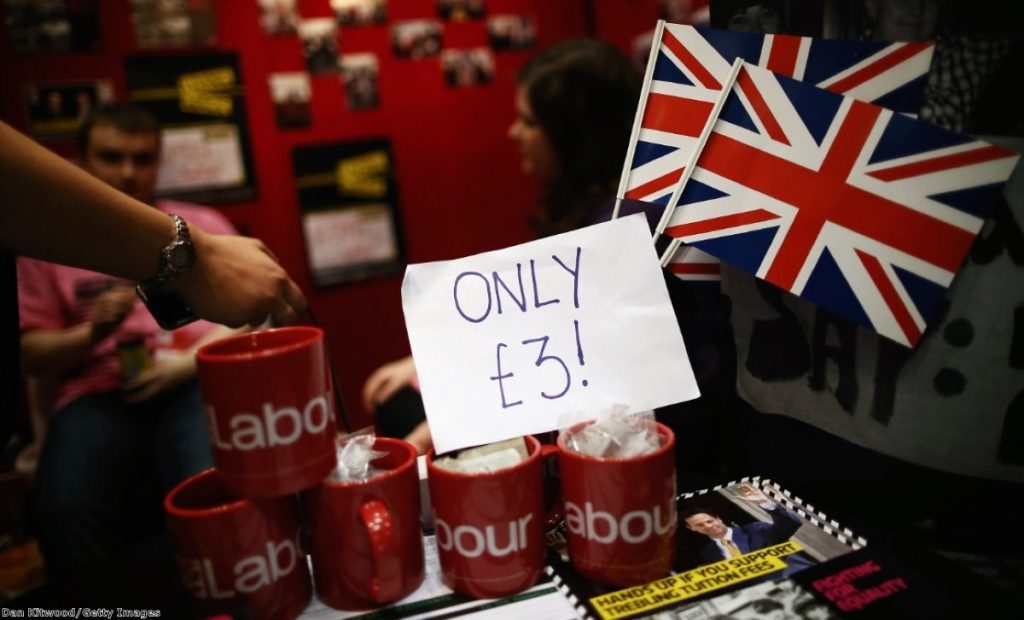It’s official: Cash-strapped Labour can’t compete in 2015
Labour's masterplan to win the 2015 general election through chit-chat rather than cash is riddled with holes – and allows the Conservatives buy their way back into power.
Ed Miliband's campaign launch in Salford today contains a bold ambition: a call on his party's supporters to double the number of conversations they hold with voters in the run-up to polling day on May 7th.
Four million individual chinwags is a lot, but Labour thinks they can make a real difference. In 2010, constituencies where the party contacted 30% of voters saw an improvement in Labour's share of the vote of over five per cent. That might not sound like much but it could be enough to take Labour over the line in the most critical marginals.
Much of the work has already been done, too. Labour was averaging 21% of voters in the autumn and was pushing to reach an average of 25% by the new year. It has 17 weeks to get that proportion up to 30% and make the difference.


As Douglas Alexander, Labour's general election coordinator, stated in an article on Friday, "it is on the ground where this election will be won or lost". He thinks the public's desire for dialogue – as demonstrated in the Scottish independence referendum – makes this national contest one that must ultimately be fought locally. He writes:
"That's why we've placed more than 100 community organisers in key seats across the country, more than Labour has had in any election before. The Tories may be able to outspend us by as much as three to one, but on the ground in the key seats, we aim to outnumber their diminished and demoralised activists by the same margin as we fight this election conversation by conversation, doorstep by doorstep, community by community."
You might have spotted a very awkward fact thrown in there – the three-to-one spending ratio, which is not addressed directly but is big, bad news for the opposition. In 2010, the Tories spent £16.6 million to Labour's £8 million. That two-to-one ratio was bad enough. Alexander's grim forecast suggests Labour is expecting things to be much worse in 2015.
Total spending on 2010 UK general election: £31.5m ($49.9m) by parties. £2.8m ($4.4m) by outside groups http://t.co/9V9czysrhA
— David Rennie (@DSORennie) November 7, 2014
We knew something like this was coming. Research by the Bureau of Investigative Journalism showed how Tory fundraising dinners were resulting in rich donors' cash being funnelled directly into 80 key seats – the 40 the Tories want to hold on to and 40 more they want to gain. The rise of secretive dining clubs, in which individuals can donate without having to reveal their identities, has played an important role, too. And Ed Miliband's decision to defy the unions and reduce the party's income from them wasn't going to help either. They simply haven't been able to match the £78 million raised by the Conservatives over the last four years, and now they're going to be blown out of the water.
Or, just possibly, not. Facing unavoidable defeat in the funding battle, Alexander and co have instead put their faith in alternative means of achieving victory. They hope clever campaigning tricks like gathering data using social media, for example, will make everything better. Last year, for example, people were invited to put their postcode, email and date of birth into a social media form to get their 'NHS baby number'. That information will be very useful come election time. The political parties crave intelligence about their voters – that's the whole point of canvassing in the run-up to campaigns, to build up as detailed a picture as possible of what kind of person lives where. They want to know what policies you care about, and when you go to work, and how you intend to vote. Anyone who got their 'NHS baby number' can expect some health-oriented literature through the post before May 7th.
My grandson was the 29,714,341st baby #bornontheNHS. Find out which number baby you were >> http://t.co/GtJ6y4bCuY
— patsypalmers mum (@patsypalmer1) December 17, 2014
There's a sense Labour could have done much more, though. Arnie Graf, the US elections expert, was supposed to be in charge of community organising but hasn't contributed nearly as much as many hoped. David Axelrod, the glitzy ex-Obama alternative, has barely been spotted on these shores. That leaves left-wing types wringing their hands that not enough has been done to fix the broken bridge between Westminster and the styx – that far-off, remote place where ordinary people and ordinary activists actually live.
The Westminster bubble and the 'air war' that Alexander now pooh-poohs matter, too. Miliband is comprehensively losing the latter, as today's press conference from Cabinet ministers about Labour's uncosted spending commitments will demonstrate all too well. His shaky strategic vision remains uncertain and may not show up before polling day at all, hitting voters' confidence in him but also the effectiveness of Labour supporters on the doorstep. How are they supposed to hold four million conversations with voters when they haven't got a clear enough direction about what this contest is actually about?
.@MatthewParris3 on party funding: "who will break this eerie silence?" #democracyltd pic.twitter.com/BExcu72hbt
— Bobby Friedman (@BobbyFriedman) January 3, 2015

